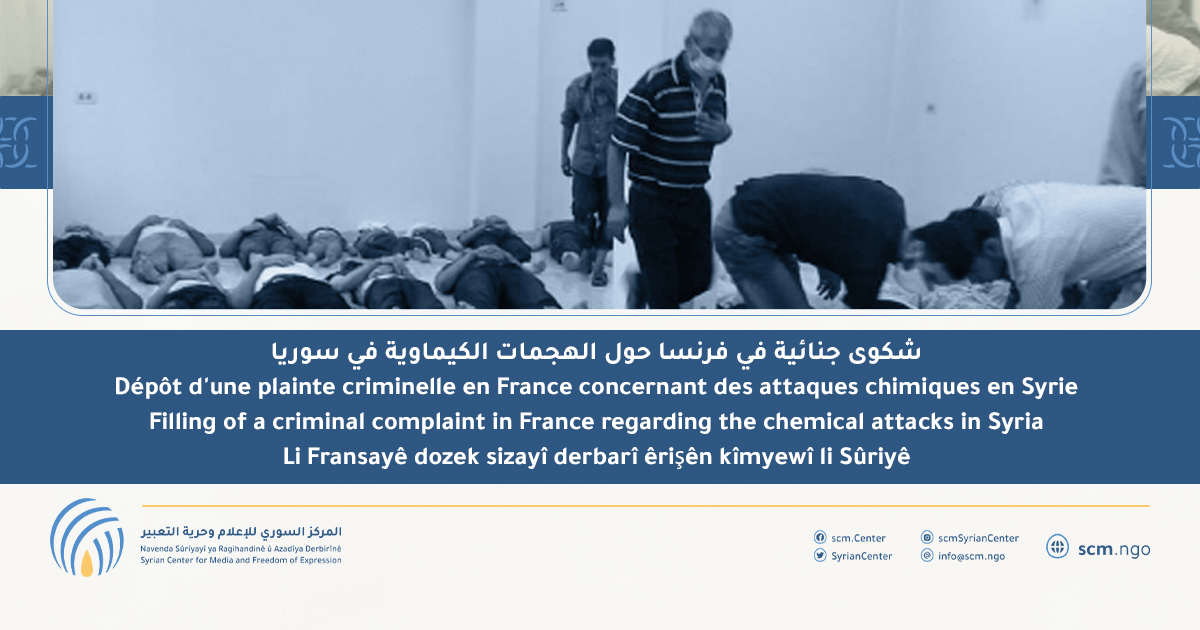Press Release
Tuesday, 2 March 2021
PARIS– A group of survivors and the Syrian Center for Media and Freedom of Expression (SCM), with the support of the Open Society Justice Initiative and Syrian Archive, announced that they are seeking a French criminal investigation of chemical weapons attacks in Syria. In support of chemical attack survivors’ fight against impunity, a criminal complaint has been filed before investigative judges in France regarding the August 2013 chemical weapons attacks on the city of Douma and on Eastern Ghouta. The complaint contains extensive testimonies from numerous survivors, with the hope that a French investigation into these crimes can result in accountability for those who ordered and carried out the attacks which killed more than a thousand people, including many children.
In addition to first-hand testimonies, the complaint, which takes the form of a civil party application, contains a thorough analysis of the Syrian military chain of command, and hundreds of items of documentary evidence, including photos and videos. In addition to providing judges with new information and investigative leads, the filing points to the Syrian government’s alleged responsibility in carrying out the attacks, which constitute war crimes and crimes against humanity.
“We have compiled extensive evidence establishing exactly who is responsible for these attacks on Douma and Eastern Ghouta, whose horrific effects continue to impact survivors,” said Hadi al Khatib, founder and director of Syrian Archive. “The Syrian government still has not come clean about its chemical weapons production, use, and storage, which means it still poses a threat to its own civilians, as well as to international peace and security. It must be held accountable.”
“It is unacceptable that chemical weapons be used against civilians without accountability. If we allow this, not only will such attacks happen again, but we will also expose all of humanity to real risks,” added Mazen Darwish, president of SCM. “Holding the perpetrators of these crimes in Syria accountable would not only provide a measure of justice owed to their victims, but also ensure greater global peace and security. That’s why, in addition to investigating and prosecuting these crimes when they have jurisdiction, countries must cooperate to also create a special international court to try these crimes.”
The principle of extraterritorial jurisdiction authorizes French courts to investigate and prosecute international crimes committed on foreign territory by foreign nationals. In October 2020, the Justice Initiative, Syrian Archive, and SCM filed a similar complaint before the Office of the German Federal Public Prosecutor on the Syrian government’s 2013 and 2017 sarin attacks on Eastern Ghouta and Khan Shaykhun. Together, the French and German complaints include evidence from the most detailed investigations to date into these attacks.
“We urge the French judges to jointly investigate the attacks on Eastern Ghouta with the German prosecutor. By pooling resources and efforts, countries can more easily compile strong evidence against the Syrian officials most responsible,” said Steve Kostas, a lawyer at the Justice Initiative. “This would allow judicial authorities in different countries to have criminal cases ready to prosecute these Syrian officials can be arrested.”
France leads the International Partnership Against Impunity for the Use of Chemical Weapons and has vigorously denounced the use of chemical weapons in Syria. France has also requested that the Organization for the Prohibition of Chemical Weapons (OPCW) suspend Syria’s “rights and privileges,” which would include its voting rights in the organization, for failing to meet a July 2020 deadline to declare the chemical weapons used in its 2017 attacks on Latamneh and to disclose its chemical stocks. France’s proposal, backed by over 40 countries, is expected to be discussed during the Spring 2021 meeting of OPCW states parties.
The civil parties in the case are represented by Paris-based lawyers Jeanne Sulzer and Clémence Witt.





